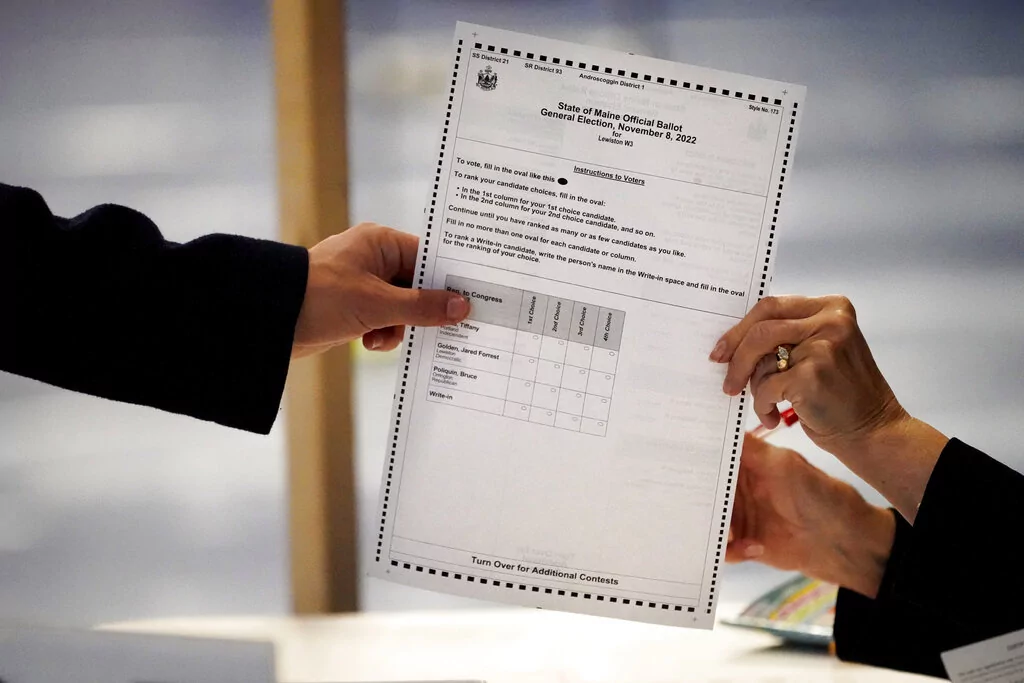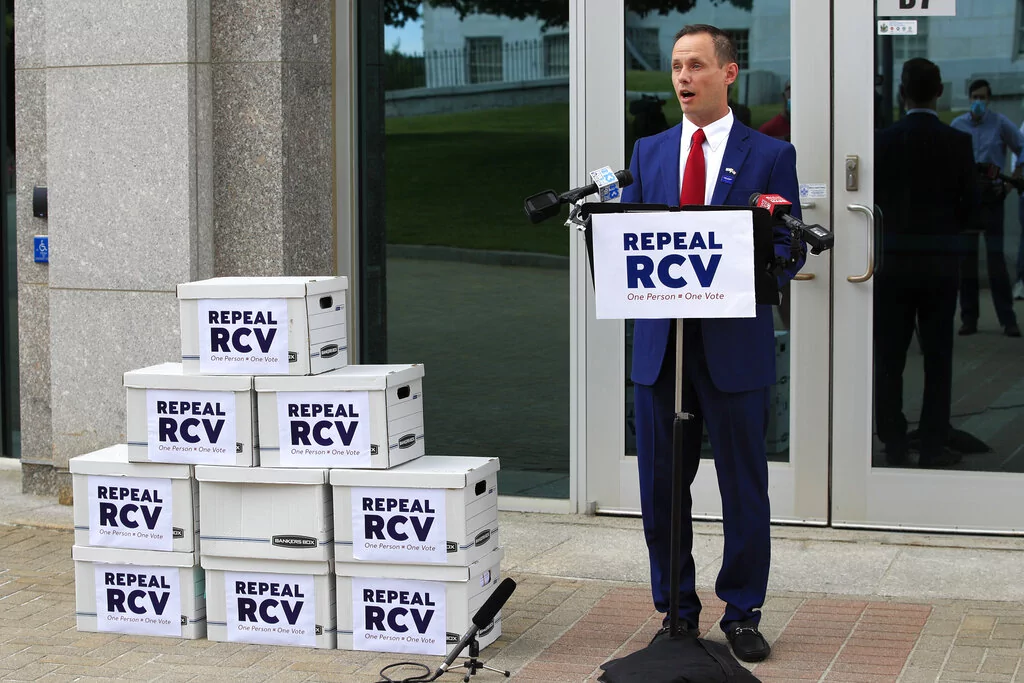
The 2024 elections include a raft of ballot measures across every state. Voters will be asked to mark their preference on controversial topics such as abortion, school choice, the legalization of drugs, and much more. This Washington Examiner series, Direct Democracy, will take a forensic look at several of these items. Previous installments covered measures on abortion, minimum wages, and school choice. Part 4 focuses on measures to change elections.
States throughout the country will vote on ballot initiatives that would alter elections, including by implementing ranked choice voting or implementing protections against noncitizen voting.
Nine states and Washington, D.C., will decide whether to implement sweeping changes to the way elections are conducted. The bulk of these ballot questions surround nonpartisan primaries and ranked choice voting, which proponents contend improves voter representation and reduces polarization.
North Carolina, South Carolina, and Wisconsin will also decide whether to adopt “Citizen-Only Voting Amendments” that proponents say would clarify ambiguities in existing state law.
The implementation of ranked choice voting would have sweeping effects on general elections. Backers say that it will improve the quality of elected representatives and give voters more choice. But critics argue that it causes confusion, and some conservatives have said it puts them at a disadvantage. Missouri will vote on banning it altogether.

Nonpartisan Primaries and Ranked-Choice Voting: A Growing Movement
Nick Troiano, founding executive director of Unite America, described this year as a turning point for electoral reform. “Never before have we seen this many initiatives on the ballot in one year to reimagine how we elect our leaders, especially in abolishing party primaries,” Troiano told OPB.
Ranked choice voting initiatives are on the ballot in Arizona, Colorado, Idaho, Nevada, Oregon, and the District of Columbia. Conversely, Alaska and Missouri will decide on prohibiting ranked choice voting.
Ranked choice voting allows voters to rank candidates in order of preference. If no candidate receives a majority of the first-choice votes, the lowest-ranked candidate is eliminated, and those votes are redistributed based on voters’ next preferences. This process continues until one candidate achieves a majority.
According to FairVote, ranked choice voting is in place in 50 U.S. jurisdictions that cover 13 million voters. Meanwhile, at least 10 Republican-led states, including Texas, Oklahoma, and Florida, have laws that ban ranked choice voting.
Advocates argue that this system encourages more centrist candidates and broader voter participation, while opponents raise concerns about voter confusion and the removal of party control.
Honest Elections Project Executive Director Jason Snead previously told the Washington Examiner that places where ranked choice voting is activated typically turn into a “convoluted scheme that confuses voters.”
“Across the country, millions of citizens will be faced with the option of banning or enshrining [ranked choice voting] in their state,” Snead said, noting that “Ballot issues are often overlooked, and in particular, the activists behind RCV measures usually don’t want to admit they are pushing for ranked choice voting.”
Meanwhile, Alaska and Arizona will have ballot measures seeking to require partisan primaries, which shield non-party members from voting. Arizona, Colorado, Idaho, Montana, Nevada, and South Dakota will vote on adopting multiparty primaries, where any voter can vote regardless of party affiliation.
The Impact in Alaska
One notable example of ranked choice voting’s implementation is that of Alaska. The state adopted a top-four nonpartisan primary and ranked choice voting system in 2020. In its first use, during the 2022 election, this system notably helped Democrat Mary Peltola win the state’s U.S. House seat, defeating Republican candidates, including former Republican Gov. Sarah Palin.
Palin, once a highly popular figure, was denied the because of the ranked choice process in part because she failed to attract enough second-choice votes from supporters of the centrist Republican candidate Nick Begich. Critics of ranked choice voting have pointed to the Palin race as an example of how it can spur unexpected outcomes by giving voters more power to rank candidates rather than the typical two-party decision process.

But Alaska will be given the opportunity to unwind what has become one of the testing grounds for ranked choice voting. Voters will face a new ballot measure, Alaska Ballot Measure 2, that would reestablish a party primary system.
Several states will vote on variations of nonpartisan primaries and ranked choice voting, each tailoring the system to their unique electoral environments:
Arizona
Voters will decide on Proposition 140, which would eliminate partisan primaries and allow all voters to choose from any candidate in the primary election. But the measure would also open the door to ranked choice voting in if multiple candidates move forward to the general election.
Voters will also be asked to decide Proposition 133, which would protect the long-standing practice of partisan primaries and block any other form of a primary election, and is viewed as a defensive move to block open primaries.
Arizona has had partisan primary elections since statehood, and the measure would also require cities to use a partisan system. Most cities have adopted nonpartisan primaries, meaning candidates run without a party label.
Colorado
A measure, Initiative 310, now on the ballot as Proposition 131, would create a top-four primary system so candidates from all parties run against each other, and ranked choice voting for general elections, echoing the model used in Alaska.
Colorado’s voters, including its large number of unaffiliated voters, could see more flexibility in choosing candidates if the measure passes.
But Democratic Gov. Jared Polis signed a law in June that places limits on 310 by creating guardrails for when it can go into effect. If Initiative 310 passes, the law passed by Polis would pause the implementation of the initiative until local governments pass similar changes to their election laws.
Washington, DC
Ballot Initiative 83 in Washington, D.C., proposes a shift to semiopen primaries and ranked choice voting, allowing unaffiliated voters to participate in party primaries and rank their preferred candidates in the general election.
Nevada
Nevada voters will have the chance to pass Ballot Question No. 3, which would establish a top-five primary system and ranked choice voting. If approved, this change would need to pass a second time in the 2024 election to take effect.
Montana
Montana will see two paired ballot issues. Montana CI-126 considers whether to establish a top-four primary system, while the other mandates that general election winners must have majority support, which could mean implementing ranked choice voting or using a runoff system.
Montana currently has open partisan primaries, meaning voters can choose which party primary they want to participate in, but they can only vote in one party’s election.
Oregon
Measure 117, if passed, would introduce ranked choice voting for both primary and general elections starting in 2028.
This proposal would apply to elections for president, Congress, governor, and other statewide offices like secretary of state and attorney general.
Additionally, ranked choice voting could be extended to certain local offices, giving voters the option to rank candidates for various elected positions.
Idaho
Idaho voters will decide on Proposition 1, which would establish a top-four primary system and implement ranked choice voting for general elections.
The ballot initiative seeks to overturn the state’s current ban on ranked choice voting, enacted in 2023.
Currently, political parties in Idaho can limit primary participation to voters registered with the party, but this measure would open up the process to all voters.
Missouri
Missouri voters will decide whether to approve constitutional Amendment 7, which would ban ranked choice voting.
Although the state does not use the voting method, supporters of the measure like state Rep. Brian Seitz told the Kansas City Star that ranked choice voting “doesn’t seem to work.”
“It’s not the way we do things here in Missouri,” he said. “Let’s pick our candidates in the primary and may the best man or woman win.”
Kansas City Mayor Quinton Lucas is opposed to the measure because he believes it is not an issue voters should be deciding “on a state level.”
Byron Keelin, president of the pro-Amendment 7 organization Freedom Principle MO, compared a “Yes” vote on the measure to a form of “insurance for the integrity of our elections.”
“And it will, you know, make sure that we stick to the, you know, our constitutional standard of one person, one vote,” he told KSMU.
North Carolina
North Carolina’s 2024 ballot will include a constitutional amendment aimed at explicitly restricting voting to U.S. citizens in all state and local elections. The proposed amendment, which has gained bipartisan support, specifies that “only a citizen of the United States” is eligible to vote, a clarification proponents argue is necessary to address ambiguities in current state law.
Wisconsin
Wisconsin’s ballot will feature a measure to amend the state constitution to explicitly limit voting rights to U.S. citizens for all state and local elections. Proponents say this would prohibit noncitizens from participating in any Wisconsin elections, while critics say the law already clearly disallows noncitizen voting and have labeled it as a fear tactic to rally people to the polls.
South Carolina
A proposed amendment to South Carolina’s constitution, known as the “Citizen-Only Voting Amendment,” would clarify that only U.S. citizens are eligible to vote in state and local elections.
The amendment has bipartisan support and is meant to prevent any attempts to allow noncitizen voting, aligning South Carolina with other states moving to solidify citizen-only voting requirements in their constitutions.
Background on noncitizen voting
Nearly 20 cities and localities around the nation have allowed some form of noncitizen voting.
Voters in Santa Ana, California will decide on an Election Day ballot initiative known as Measure DD, which would amend the city’s charter and give noncitizens the right to vote in local elections, including for mayor, city council, and local ballot measures.
CLICK HERE TO READ MORE FROM THE WASHINGTON EXAMINER
Meanwhile, San Francisco has drawn criticism after a noncitizen Chinese immigrant was sworn in on the city’s election commission earlier this year.
According to local outlet El Tecolote, noncitizens will be given the ability to vote in the school board election for the San Fransisco Unified School District. Adult parents and legal guardians will be eligible to vote in the race so long as their child lives in the city, and if they are not barred from voting due to any mental incapacity or felony record.







